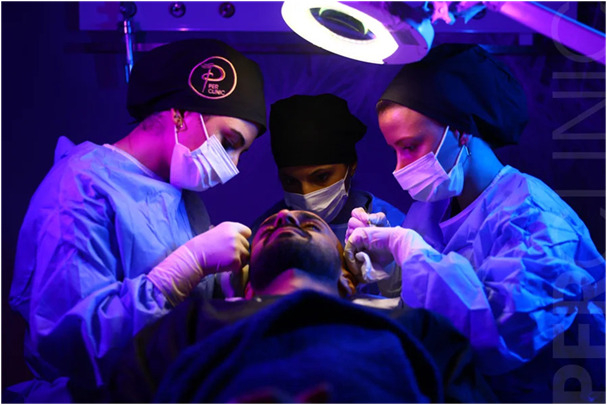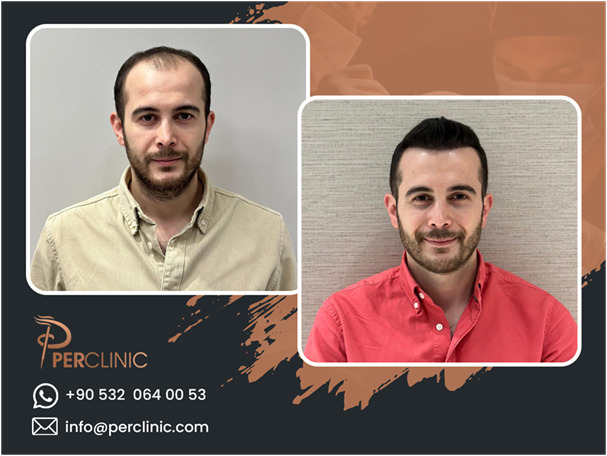Over the last decade, Turkey has quietly become the “world capital of hair transplants”. Thousands of men and women fly into Istanbul every month for treatment, attracted by experienced surgeons, modern hospitals and prices that are often 60–70% lower than in the UK or U.S.
In this guide, we’ll walk through 10 well-known hair transplant clinics in Turkey and then break down what really changes hair transplant prices in Turkey to explain why one quote is €1,800 and another is €4,500 for a seemingly similar procedure.
Importantly, the list below is not an official ranking and is for informational purposes only. Always do your own research, check recent reviews and speak directly with clinics before making a decision.
1. Per Clinic
Per Clinic is a boutique-style hair transplant provider, focusing on a limited number of patients per day. Like many modern Turkish clinics, it typically works with follicular unit (FUE) and direct hair implantation (DHI) techniques and all-inclusive packages that cover hotel and transfers.
That model appeals to international patients who want a more personal experience rather than a high-volume “hair transplant factory”. Always ask which doctor will design your hairline and who will actually perform the critical parts of the surgery.
2. Smile Hair Clinic
Smile Hair Clinic in Istanbul is frequently mentioned in international “best clinic” round-ups and is known for FUE and DHI hair restoration, custom treatment plans, and strong aftercare. Their published packages for Sapphire FUE and DHI sit in the mid-range of the Turkish market, usually including hotel, transfers, and post-op kit. If you like structured processes, clear communication, and a “clinic brand” rather than a one-man operation, Smile is often on the shortlist.
3. Base Médicale
Base Médicale targets French-speaking and European patients, combining hair transplant surgery with full trip organization in Istanbul. From airport pickup to hotel check-in and clinic visits, most of the logistics are handled for you, which reduces the stress for first-time medical tourists. They emphasize detailed pre-arrival consultation, so you usually know your approximate graft count and technique before you even land.
4. Dr. Yetkin Bayer Clinic
Dr. Yetkin Bayer’s clinic is one of the long-established names in Istanbul with more than 25 years in the field and tens of thousands of procedures performed. The practice markets itself around doctor-driven planning, natural hairline design, and long-term follow-up, which many patients appreciate when they are nervous about flying in from abroad. Package offers commonly include accommodation, transfers, and translation support.
5. Medart
Medart Hair and Medart Clinic focus heavily on hair transplants and aesthetic procedures, combining a VIP-style, boutique approach with relatively competitive pricing. They position themselves between budget mass-market clinics and ultra-premium centers: fewer patients per day, modern interiors, and a lot of hand-holding before and after the operation. If you want a comfortable environment without paying London- or Dubai-level prices, this type of clinic can be a good middle ground.
6. Sapphire Hair Clinic
Sapphire Hair Clinic is a dedicated hair center in Istanbul that offers classic FUE, Sapphire FUE, FUT and DHI techniques, and operates within a major private hospital group. They are also known for accepting more complex cases, including some patients with medical conditions such as controlled HIV, which not all clinics are equipped to handle. International patients typically choose them for the hospital setting, multiple technique options and structured package pricing.
7. Buk Clinic
Buk Clinic runs on a more bespoke, surgeon-led model. Reports describe it as a respected hair transplant facility that takes on fewer patients per day to keep the head surgeon deeply involved in consultation and channel opening. That attracts people who don’t want to feel like “number 17 of the day”. Expect modern technology and a focus on one-to-one communication; in return, you may pay a bit more than at high-volume budget clinics.
8. Aslı Tarcan Global / Aslı Tarcan Clinic
Aslı Tarcan is a well-known brand in Turkey’s aesthetic and medical tourism scene, offering hair transplantation alongside cosmetic surgery, dentistry, and other treatments. Their hair transplant arm performs FU, DHI, as well as beard and eyebrow restoration, and works heavily with international patients through all-inclusive packages. According to their own information, hair transplant prices in 2025 usually range roughly between $900 and $5,000, depending on technique and graft count.
9. Dr. Serkan Aygin Clinic
Dr. Serkan Aygin is one of the most internationally advertised Turkish hair transplant surgeons, with over 25 years of experience and a large dedicated clinic in Istanbul. The clinic highlights single-use instruments, transparent package pricing and modern methods like DHI and Sapphire FUE. Their detailed cost breakdowns show per-graft prices and total ranges, giving a realistic idea of what a larger case (4,000–5,000 grafts) might cost in Turkey compared with the U.K. or U.S.
10. ASMED Surgical Medical Center (Dr Koray Erdoğan)
ASMED, led by Dr Koray Erdoğan, is considered a high-end, technology-heavy hair transplant center. Strongly focused in FUE, they use advanced digital scalp analysis and “coverage value” calculations to design the surgery. ASMED tends to attract patients who are deeply involved in hair-loss forums and are willing to pay a premium for meticulous planning, detailed documentation, and a slower quality-over-quantity approach.
What Really Changes Hair Transplant Prices in Turkey?
You’ll quickly notice that quotes from Turkish clinics can vary from around $1,100 to over $6,000 for a full hair transplant in Turkey. Here are the five main factors behind those numbers:
Technique and technology
Different methods come with different costs:
- Standard FUE is often the baseline.
- Sapphire FUE (using sapphire blades for incisions) and DHI (using implanter pens) usually sit higher in the price range.
- A few clinics even offer robot-assisted procedures at a premium.
In Turkey, published averages for a complete transplant typically fall between €2,000–€3,500, with DHI sometimes priced higher and per-graft prices often around $0.70–$1.20.
Number of grafts and case complexity
The more grafts you need, the longer the surgery and the larger the medical team involved. Advanced baldness (Norwood 5–7) can require anywhere from 4,000 to over 5,000 grafts, which pushes you into the upper end of typical Turkish price ranges, while a smaller hairline restoration might stay near the minimum.
Certain cases, such as repair work after a failed transplant, Afro-textured hair, or combining beard and scalp work may also increase the cost because they demand extra skill and time.
Surgeon’s reputation and clinic positioning
Just like in any country, a surgeon with a strong international reputation or a clinic running a high-end, low-volume model will charge more. Centers like ASMED, Dr Serkan Aygin Clinic, Yetkin Bayer Clinic and other premium players position themselves at the higher end of the Turkish market, while more budget-oriented clinics keep prices low by operating at greater volume and simplifying packages.
What’s included in the package
Most Turkish quotes are all-inclusive, but what’s actually included can vary:
- Airport transfers
- Hotel (3–5 stars, 2–4 nights)
- Blood tests and medications
- Translator
- Post-op shampoo and care products
- Long-term online follow-up
A clinic offering a five-star hotel, private driver and lifetime check-ins will naturally charge more than a basic “procedure only” package.
Safety standards and aftercare
On paper, two clinics might offer “DHI, 4,000 grafts, hotel included.” In reality, one may be operating inside a large, accredited hospital with a highly trained team, while another has a cramped, poorly regulated setup focusing almost entirely on volume.
International reporting has warned that parts of the hair transplant industry — especially for medical tourists — can feel like the “wild west”, with unlicensed operators and inconsistent safety standards.
That safer, better-regulated environment costs money to maintain. So if a quote looks too cheap, it’s worth asking where corners are being cut.
How to Choose the Right Clinic for Your Budget
Price matters, but it shouldn’t be your only filter. Before you book:
- Confirm the surgeon’s name and check their background, not just the clinic’s brand.
- Ask who designs the hairline and who does the incisions/channel opening (doctor vs technicians).
- Look for recent, independent reviews on platforms like Trustpilot or Google, not just testimonials on the clinic’s own website.
- Request clear photos of previous patients with a similar hair type and level of hair loss.
- Make sure the quote explains technique, estimated graft count, inclusions and exclusions.
- Avoid hard-sell tactics or clinics that refuse to discuss potential risks and complications.
If a clinic is transparent, patient-focused and happy to answer detailed questions, that’s usually a very good sign.
Frequently Asked Questions About Hair Transplant in Turkey
How much does a hair transplant in Turkey cost in 2025?
Most reputable clinics in Turkey quote between $2,000 and $4,500 for a standard FUE or Sapphire FUE transplant, with DHI and very large graft numbers pushing the upper end or beyond. The final figure depends on your hair loss situation, chosen technique, surgeon and package level (hotel class, transfers, and extra treatments). Always insist on a personalized quote based on clear photos and a medical assessment.
Why is hair transplant so much cheaper in Turkey?
Lower prices don’t automatically mean lower quality. Turkey’s costs are reduced by a lower overall cost of living, high patient volume, strong competition between clinics and government support for medical tourism. When many clinics perform hundreds of procedures each year, they can invest in dedicated hair units and spread their fixed costs over more patients, which brings the per-patient price down compared with Western Europe or North America.
How many days do I need to stay in Istanbul?
Most clinics recommend 3–4 days in Istanbul: one day for arrival and consultation, one for surgery, and one or two for the first wash and early follow-up. Some patients fly back after 48 hours, but staying an extra day gives you time to rest, manage swelling, and have your first wash done by the clinic team, which many find reassuring.
Are all-inclusive packages worth it?
For most international patients, yes. When a clinic bundles a hotel, transfers, and a translator with the procedure, you avoid logistical headaches and unexpected taxi or accommodation costs. Packages also make it easier to compare quotes. Just don’t let the “luxury hotel” distract you from the medical side; prioritize the surgeon’s experience, safety standards, and medical team over free breakfasts or city tours.
Does a higher price always mean better results?
Not always. A mid-priced clinic with a careful, experienced surgeon and excellent communication can outperform an ultra-premium brand that is overbooked — and certainly a bargain clinic cutting corners. Still, extremely low prices can be a red flag, especially if graft numbers are vague or the clinic refuses to discuss who will perform the key stages of surgery. Try to balance budget, medical quality and your own risk tolerance.
How many grafts do I typically need?
For a receding hairline only, patients often fall in the 2,000–3,000 graft range. For hairline plus crown, it may exceed 3,500–5,000 grafts, depending on your hair type and density goals. Only a qualified doctor who has examined your donor area (ideally in person or via clear photos/video) can give a realistic estimate. Be wary of clinics promising 5,000–6,000 grafts without checking whether your donor area can safely support that.
Is Turkey safe for hair transplant tourism?
Millions of people have had successful hair transplants in Turkey, and many clinics follow high standards in modern hospital environments. At the same time, there are poorly regulated operators. Your safety largely depends on which clinic you choose, how honestly they assess your medical history. and whether they prepare properly for complications. Check that your chosen clinic is licensed, operates in an appropriate medical setting and has a clear plan for aftercare and emergency situations.
Media Contact
Burak Önal
info@crabsmedia.com



